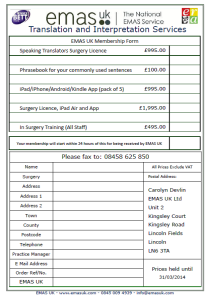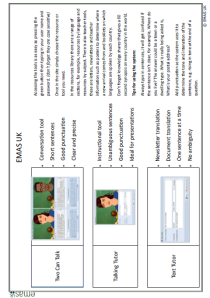The new article http://watchnewspapers.com/bookmark/24549811-RAISING-ELLE-A-Compelling-Argument-for-Bilingual-Education really sets the scene from the patients point of view when dealing with medical issues. It also bears out our research at a Coventry hospital gynecological and maternity unit where patients found Clairetalk to be invaluable.
The patient in this article clearly cites incidences where she feels the experience could have been improved but also where Education embracing bilingualism could also support more children in schools.
Six years ago this week I was sitting naked in a doctor’s examining chair, nine months pregnant and attempting to understand what my French-speaking OB-GYN was talking about.
It was an unsettling experience indeed, the naked and enormously nine-month-pregnant part, since it was a rude awakening to learn that the French don’t seem to care that those flimsy paper coverups exist. After spending half of my pregnancy and giving birth to my first child in France, and thus spending an exorbitant amount of time naked on examining tables, I vowed I would never take disposable exam gowns for granted again.
My modesty aside, the experience was most disquieting due to the fact that French words were rattling like pinballs inside my head. In the fractions of seconds it took my English-starved brain to process words like “Césarienne,” Dr. Martin had already spewed 15 more that I didn’t have the time or mental fortitude to translate. And this was a conversation I desperately needed to understand.
Two weeks before my due date, I sat in that chair as my already frazzled language-learning synapses grasped frantically at every four or fifth word I could comprehend. Painstakingly, after many sheepish requests that he “Parlez plus lentement, s’il vous plait” (speak slower, please), I was able to stack together enough of the puzzle to understand what he was telling me.
(Dr. Martin spoke one word of English: naked. So the beginning of the appointment had gone well. He pointed at me and commanded, “Naked!” so that’s what I did. It went downhill from there. Dr. Martin made it clear that he found it utterly annoying that an American woman would come to France and need her doctor to speak English. Some things, I discovered during our winter in France, need no translation.)
My “accouchement” (birth) would be “anormal” (abnormal) because the baby soon to be known as Elodie was “au siege” (breech), and I would need to plan for a “Césarienne,” (C-section.) It would be next week, on Fevrier 22, merci et au revoir!
It was certainly my choice to put myself in the uncomfortable position of being giant-bellied and stark naked in a country where I spoke the language as well as a native 2-year-old. So I took the mental battering as well as I could, considering our circumstances, and now that I look back, I’m more grateful than ever that Craig and I were naïve enough to think that having a baby in France would be “pas de problem.”
I have a beautiful daughter with a French name and birth certificate, and, in addition, a much more acute appreciation of the need for learning a second language.
Last month, the Telluride School District’s Global Fluency Committee gave a presentation on incorporating bilingual education into the elementary school curriculum. More than half of the world’s population (65 percent) are bilingual or multilingual. Young children learn languages easily, and learning another language has been shown to enhance a child’s proficiency in his or her native tongue, we learned.
While in France, I noticed that nearly everyone in Tignes, the ski resort where we lived for a season, on Ski Patrol exchange, spoke at least enough English to get by. Nearly half of that resort’s visitors come from English-speaking countries, so speaking English is just a part of doing business. I also observed, with much awe, that the children in the Tignes preschool were already being given lessons in English.
As it turns out, France isn’t the only place where non-native languages are quickly gaining traction.
School-age children who speak a language other than English at home are one of the fastest-growing populations in the United States, studies suggest. Their numbers doubled between 1980 and 2009, and now comprise 21 percent of school-age kids.
There were 4.7 million students classified as “English language learners” – those who have not yet achieved proficiency in English – in the 2009-10 school year, or about 10 percent of children enrolled, according to the most recent figures available from the U.S. Department of Education.
Bilingual education has long been a hot-button issue in America, raising issues like immigration and civil rights. California, Massachusetts and Arizona have actually banned bilingual education, claiming that it hinders, rather than helps, students who lack proficiency in English.
Thus far, much of the bilingual-education debate has centered around whether or not bringing non-English speakers to English proficiency is the duty of the public school system, and if so, how can it best be done. Statistics show that many schools’ non-English speakers actually fare worse in standardized tests when educated under a bilingual system.
Yet proponents of bilingual education counter that the schools boasting the highest percentages of non-English speakers, which offer some form of bilingual education, are usually located in the lowest-income school districts and thus face an array of roadblocks to offering quality education overall, including large class size and insufficiently trained teachers.
The bilingual education debate isn’t new. In response to a growing outcry that non-English-speaking students weren’t getting an equal education due to a dearth of teachers and programs promoting multilingual studies, Congress passed the Bilingual Education Act in 1968. Later, the National Advisory Council on Bilingual Education was formed to articulate a plan for a national policy in bilingual education.
In the language of the federal law: “Where inability to speak and understand the English language excludes national origin minority group children from effective participation in the educational program offered by a school district, the district must take affirmative steps to rectify the language deficiency in order to open its instructional program to these students.”
Yet a part of the debate that seems to be emerging more recently centers around the idea that bilingual education can benefit students other than those who don’t speak English. English-speaking students, when educated early under a truly bilingual program (in which 50 percent of class time is spent speaking English and 50 percent speaking another language, like the system TSD’s Global Fluency Committee has proposed,) have been shown to excel in their native language as well as a second language. As bilingual graduates, they enter a growingly diverse world job market better prepared. And though studies can’t prove it, I’m willing to bet that on average, citizens who speak another language would have a healthier respect and understanding of other cultures.
Let’s end the debate and start seeing the world, and our children’s place in it, for what it really is: Culturally and linguistically diverse. Let’s raise our children with not just a healthy respect for other cultures and languages, but with a solid comprehension of those cultures and languages. And that means educating them early in the languages of other cultures.
I heartily applaud the Telluride School District’s Global Fluency Committee’s forward-thinking approach to closing the multilingualism gap that currently exists between American students and the rest of the world. Let’s raise up all of our community’s students, by offering them the chance to speak the all-inclusive language of cultural acceptance.
What do you think? I am sure our doctors dont have the same attitude as the patients doctor all I have met want to support their patients the best way possible.
For Health providers if you want more information about Clairetalk go to the website http://www.emasuk.com and choose Healthcare
For education if you want more information about Talking Tutor, Text Tutor and our award winning two can Talk again choose http://www.emasuk.com and choose Education.


